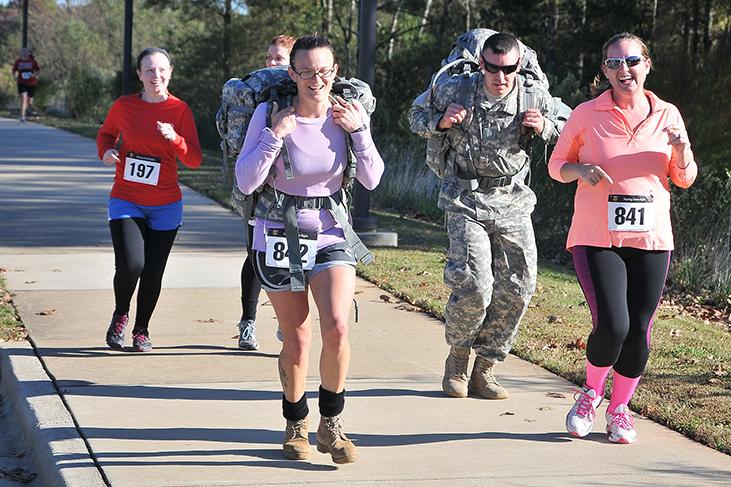A charity race helped to foster bonds between dogs and war veterans Sunday. The Student Veterans Association held the Run, Walk and Roll 5K to raise money and awareness for the charity Canine Angels.
Jon Charest, the treasurer of the Student Veterans Association, race director responsible for organizing the event, served in the Marine Corps for 10 years before coming to N.C. State.
According to Charest, the majority of the students involved with the Student Veterans Association are no longer serving.
“We don’t have too many active duty people because they’re still serving,” Charest said. “We have a few people in reserves or the National Guard. Most of us are completely out at this point.”
According to Charest, the association wanted to schedule an event for Veterans Day weekend and thought it was appropriate to partner with Canine Angels.
“Canine Angels rescues dogs from kill shelters, then pairs them up with a veteran and trains them to be a service dog,” Charest said. “So it can be any veteran with a disability, including PTSD or a physical disability.”
Charest said, depending on the level of severity, a PTSD patient may face difficulties going to class or being in large crowds.
“A service dog can work with them and provide them a connection so they’re not alone in a crowd,” Charest said.
The Student Veterans Association provided a multitude of ways for students to get involved and donate. It opened a site on gofundme.com for those unable to attend who still wanted to make a donation.
Charest said the Student Veterans Association first contacted Canine Angels in the summer knowing only that it wanted to partner with a veteran-specific charity.
“We contacted a couple different groups, but Canine Angles just seemed like the best one just because they have a duel mission,” Charest said. “They rescue dogs, and we have a lot of dog owners in the group, so it immediately got Student Veterans involved. They also provide service animals to veterans with disabilities.”
Lahna Morakis, events director with Canine Angels, worked with the Student Veterans Association for the Run, Walk and Roll 5K.
According to Morakis, Rick Kaplan, a retired New York businessperson, founded Canine Angels in 2011.
“Kaplan was never in the service but his father was,” Morakis said. “Because of the life his father led, he wanted to pay something back to the community. Since he didn’t do that as a young man, he decided to do it as an older man.”
According to Morakis, Kaplan goes to killshelters and selects dogs he thinks would be able to get into the program and make it to the end as a trained service dog.
“Kaplan spends many hours training these dogs,” Morakis said. “When the training is complete and the dog is certified, Kaplan matches them up with a disabled veteran and donates the dog to the veteran.”
According to Morakis, the veterans apply for a service dog and if the process goes well they are paired with a dog that can meet their specific needs. Each dog is trained from eight months to a year before they are matched up with a veteran and then they go through another eight months to a year of training with the veteran.
“Breed has nothing to do with the selection process at the shelter, nor does the size,” Morakis said. “We have corgis, pitbulls, golden retrievers and some we don’t even know what they are.”
According to Morakis the breed is, however, taken into consideration when selecting a dog for a veteran with physical disabilities.
“If the veteran needs help pulling a wheelchair or getting up it’s going to have to be a larger dog,” Morakis said. “If it’s a matter of PTSD, then the breed of the dog doesn’t really matter.”








